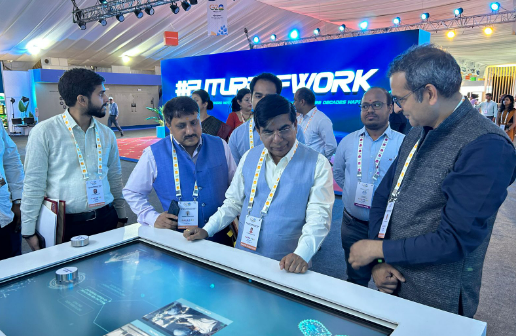The third Education Working Group meeting under G20 kicked off today in Bhubaneswar, Odisha with a seminar on ‘Building Capacities for Lifelong Learning in the context of Future of Work’ at CSIR-IMMT. The meeting is a continuation of the previous two working group meetings held in Chennai and Amritsar earlier, aimed at discussing and implementing innovative ideas and policies to globally transform the education sector. Over 60 delegates from G20 member countries, invitee countries and International Organisation countries are participating in the 3 day meeting.
On the first day of the 3rd EdWG meeting, Dr. Subhas Sarkar, the Minister of State for Education, was the Guest of Honour. He delivered a special address on the importance of education in moulding the nation’s future. He emphasised the value of skill education and informed about the many skilling initiatives offered by the Government in order to create a future-ready military. He emphasised the need for platforms such as the G20 in exchanging expertise, experiences, and best practices that will be useful in collaborative reforms in the education sector.
Speaking on the occasion, Shri Sarkar emphasized that seminar today builds on the deliberations held in the last two webinars on the evolving world of work, and the importance of foundational skills and lifelong learning. It aims to strengthen human and institutional capacity for the delivery of ‘future skills’ for a `future-ready’ workforce through upskilling, re-skilling and lifelong learning while ensuring inclusivity.
Shri Sarkar said that guided by the National Education Policy (NEP) 2020, the Indian Government is rethinking the ways deployed to develop, assess, and recognize skills, primarily through the integration of Academic and Vocational Education.
Dr. Nirmaljeet Singh Kalsi, Chairperson of the National Council for Vocational Education and Training (NCVET), also spoke at the seminar. The presentation by Shri Kalsi included inputs from G20 countries and international organisations. In addition, Shri K. Sanjay Murthy, Secretary, Ministry of Education, and Dr. Anil D. Sahasrabudhe, Chairman, National Educational Technological Forum (NETF), both spoke at the seminar by setting the context and sharing insights on Building a digital ecosystem for lifelong learning, respectively.
The seminar included three panel discussions, with panellist participation from Brazil, Spain, UAE, Singapore, Russia, South Africa, Mauritius, OECD, UNICEF, Australia, and the United Kingdom. The panel discussion themes were:
- Panel Discussion1: Building an agile response to the needs of labor markets and institutional capacity building in the context future of work: enabling high quality technical and vocational education. Shri Atul Kumar Tiwari, Secretary, Ministry of Skill Development & Entrepreneurship, chaired the panel discussion
- Panel Discussion 2: Creating pathways between higher and vocational education. Shri Sabysachi Das, Chief Executive Officer of Larsen & Toubro EduTech, chaired the discussion.
- Panel Discussion 3: Equipping children with a range of future skills to set them on the course of lifelong learning. It was chaired by Shri Sanjay Kumar, Secretary, Department of School Education and Literacy, Ministry of Education.
Delegates also attended the G20 Future of Work Exhibition where they saw cutting-edge technology and innovative ideas that are changing the way we work and learn. The exhibition features active representation from industry, academia, government agencies, multilateral agencies, startups, and other organisations, as well as an Experience Zone on the Future of Work and huge technology exhibits. Through exhibits from Meta, Hexagon, Infosys, MEITY, UNICEF, Indian Knowledge Systems Division, IIT Bhubaneswar, IIM Sambalpur, TRIFED, and many more stalls, the event highlighted the latest ideas in future of work, healthcare, mobility, agriculture, and other futuristic subjects. The proposed exhibition will provide a one-of-a-kind venue to the policymakers and educators with relevant and integrated methods to lifelong learning as a result of evolving technologies and Market trends.
Apart from the discussions , the three-day meeting also includes a cultural extravaganza, featuring traditional Odishi performances. The delegates will get a chance to experience the rich cultural heritage of Odisha and learn more about the state’s history and traditions. On the last day of the seminar, the delegates will visit the Konark temple, a UNESCO World Heritage Site that is famous for its architectural grandeur and intricate sculptures. The temple is a symbol of the state’s rich cultural heritage and is a popular tourist destination.





